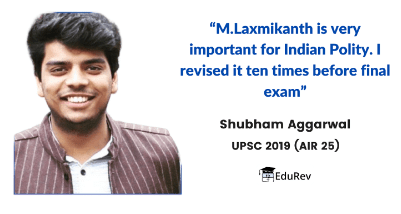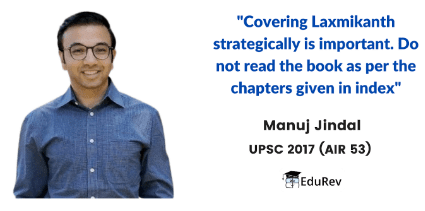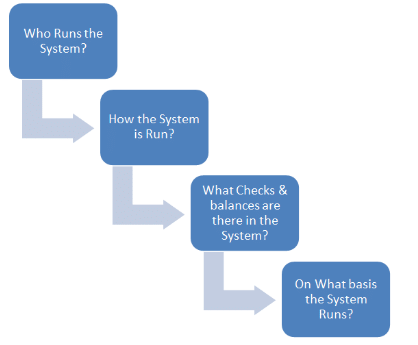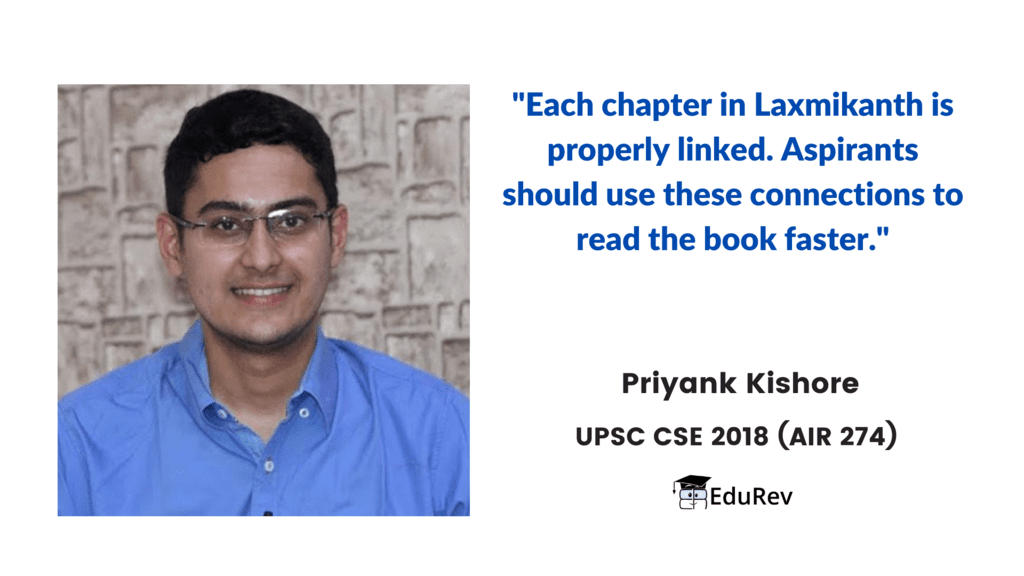Strategy: How to Study Laxmikanth for Indian Polity for UPSC CSE PDF Download
| Table of contents |

|
| Who Runs the System? |

|
| How the System is Run? |

|
| What Checks & Balances are there in the System? |

|
| On What Basis the System Runs? |

|
| What can we skip? |

|

Indian Polity by Laxmikanth is the BEST and the most recommended book for preparation of Indian Polity. It is beneficial for the Prelims as well as Mains. For Prelims, this single book is more than sufficient. For Mains, you will have to supplement it with a few additional resources and you will be good to go.
On recommendations of IAS toppers like Anudeep Durishetty (AIR 1, 2017), Srushti Deshmukh (AIR 5, 2018), Junaid Ahmad (AIR 3, 2018), Akshat Jain (AIR 2, 2018), and a few others, EduRev Experts have compiled a strategy which will help you in reading the Bible of Indian Polity: M Laxmikanth in a smooth and effective manner. You can go through the detailed strategy mentioned below following which can save you from a lot of confusion.

We are going to study the entire Laxmikanth on the basis of four questions, which divides its chapters accordingly.

Who Runs the System?
Part III: Central Government
Chapter 17. President
Chapter 18. Vice- President
- Initially, you have to start from chapter 17 & 18. These chapters will help you to understand better while starting with chapter 1 will be confusing for you.
Chapter 30. Governor (Part IV)
Chapter 16. Emergency Provisions
- After reading these chapters you will really understand some very important fundamentals and these chapters will help to connect some dots in the book because Chapter 16 is related to the three chapters we have already read (i.e. Chapter 17, 18 & 30).
Chapter 19. Prime Minister
Chapter 20. Central Council of Ministers
- After Chapter 19 & Chapter 20 you should study the following chapter because the Chief Minister in the state is parallel to the Prime Minister.
Chapter 31. Chief Minister (Part IV)
- Then you should study the following chapter because the state council of ministers is roughly parallel to the central council of ministers for the cabinet.
Chapter 32. State Council of Ministers (Part IV)
DO REVISION after studying 8 chapters that will help you to remember and to make sense what you have already read.

How the System is Run?
Chapter 22. Parliament (Part III)
- As Parliament is a long chapter so you need not to read the entire chapter, it should be covered upto budget part.
- After the first reading you should come to System of the government (Part II).
- Now you know who runs the system then you should come to know how the system is designed that’s why you should study the following chapter.
Chapter 12. Parliamentary System (Part II)
- You don't need to study the entire Chapter, budget topics can be skipped but try to do as much as possible.
Chapter 13. Federal System (Part II)
Chapter 14. Centre State Relation (Part II)
Chapter 15. Interstate Relations (Part II)
- You may also keep these chapters (13, 14 & 15) for later, it all depends upon your comfort.
Chapter 22. Parliament (Part of the chapter which is left)
- As it is a long chapter and once you have understood the parliamentary system you should come to the parliament chapter again and read it entirely but don’t go to committees and forums after that. (i.e. chapter 23, 24 & 25)
Chapter 51. Comptroller and Auditor General of India (Part VII)
- This chapter relates to some parliamentary work.
Chapter 21. Cabinet Committees (Part III)
Chapter 33. State Legislature (Part IV)
Quickly Revise the entire thing you have read!
What Checks & Balances are there in the System?
From the above chapters we have covered the sections:
(i) Who Runs the System?
(ii) How the System is Run?
- Now, to study Checks and Balances we should go to judiciary by reading the chapters.
Part III (Central Government)
Chapter 26. Supreme Court (Part III)
Chapter 34. High Court (Part IV)
Chapter 35. Tribunals (Part IV)
Chapter 36. Subordinate Courts (Part IV)
Chapter 61. Lokpal and Lokayuktas (Part VIII)
- Now after completing the Judiciary part to a good extent, we should focus on the last parts of the judiciary by reading the following chapters:
52) Attorney General of India (Part VII)
53) Advocate General of State (Part VII)
- The above two chapters are really important and you have to understand them, these two chapters will cover the last part of judiciary except some parts that we have left off.
- Now, we have to come to some of the Constitutional Bodies like:
Quickly Revise the entire thing you have read!
On What Basis the System Runs?
Part VII: Constitutional Bodies
Chapter 43. UPSC
Chapter 44. State Public Service Commission
Chapter 42. Election Commission
- After Election Commission read Anti-Defection chapter as sometimes UPSC ask questions from it.
Chapter 76. Anti Defection Law (Part X)
Chapter 45. Finance Commission (Part VII)
- Now we will study Citizenship and Rights from the following chapters:
Part I: Constitutional Framework
Chapter 6. Citizenship
Chapter 7. Fundamental Rights
Chapter 8. Directive Principles of State Policy (DPSP)
Chapter 9. Fundamental duties
Chapter 10. Amendments of the Constitution
Chapter 11. Basic Structure of the Constitution
- Make clear notes on the various articles, especially Part III (Fundamental Rights) 21, 15, 19, 32, 34, 35. Rights during an emergency need to be memorised.
- While studying the chapter on Directive Principles of State Policy (DPSP) – slot them under Gandhian, Social and Philosophical categories. Chart them according to women, backward classes, industrial workers, environment etc.
- Pay heed to the new DPSP that were added/deleted by 42nd and 44th Constitutional amendment. This is important for both Prelims and Mains.
- After covering all these chapters you have covered a lot of main portions so after that you should come to the local bodies i.e. Part 4 (Local Government)
Part IV (Local Government)
Chapter 38. Panchayati Raj
Chapter 39. Municipalities
- Chapter 38 & Chapter 39 cover two important amendments i.e. 73rd and 74th amendment.
- After reading all these you can directly go to the new changes that have been done in J & K as it is added in U.T. recently.
Part VI (Union Territories and Special Areas)
Chapter 40. Union Territories
Chapter 41. Schedule and Tribal Areas
- Now you have to do whatever is left i.e. Part 1.
Part I (Constitutional Framework)
Chapter 1. Historical Background
Chapter 2. Making of Constitution
Chapter 3. Salient Features
Chapter 4. Preamble of Constitution
Chapter 5. Union and its Territories
- You don't need to study this part before as it will make lot more sense after you got some understanding of how the entire constitution is developed.
- Now you can read the chapters that are left in Judiciary after covering the main part in judiciary:
Chapter 27. Judicial Reviews (Part III)
Chapter 28. Judicial Activism (Part III)
Chapter 29. PIL (Part III)
- From here you have covered almost the entire Judiciary.
Chapter 23. Parliamentary Committees (Part III)
Chapter 24. Parliamentary Forums (Part III)
Chapter 25. Parliamentary Groups (Part III)
- These are big chapters (23, 24 & 25) and factual based Questions are asked in the exam from these topics, so try to lump them in different segments and compartments.
Chapter 46. GST (Part VII)
Chapter 47. National Commission for SCs (Part VII)
Chapter 48. National Commission for STs (Part VII)
Chapter 49. National commission for BCs (Part VII)
Chapter 50. Special Officer for Linguistic Minorities (Part VII)
- After that go through (Part VIII) Non- Constitutional bodies because these are less important than Constitutional bodies, so go through it just once altogether.
Chapter 54. NITI Aayog
Chapter 55. National Human Rights Commission
Chapter 56. State Human Rights Commission
Chapter 57. Central Information Commission
Chapter 58. State Information Commission
Chapter 59. Central Vigilance Commission
Chapter 60. Central Bureau of Investigatio
Chapter 62. National Investigation Agency
Chapter 63. National Disaster Management Authority
Part IX: Other Constitutional Dimensions
Chapter 64. Co-operative societies
Chapter 65. Official language
Chapter 66. Public Services
Chapter 67. Rights and Liability of Government
Chapter 68. Special Provisions related to Certain Classes
- These (PART IX & X) are quicker sections because these are not very long so, this should not take lot of time.
- Read part X in the very last, and also this part is related to UPSC MAINS, you can go through this part after reading everything else.
Part X: Political Dynamics
Chapter 69. Political Parties
Chapter 70. Role of Regional Parties
Chapter 71. Elections
Chapter 72. Election Laws
Chapter 73. Electoral Reforms
Chapter 74. Voting Behaviour
Chapter 75. Coalition Government
Chapter 77. Pressure Groups
Chapter 78. National Integration
Chapter 79. Foreign Policy
- Although, everything is covered in the entire doc, if any of the chapters left you can cover it up from the book.
What can we skip?
- You can skip the Political Dynamics part, it's not required if you just want to study for Prelims. You can come back to it after prelims. But this part will help you to give better understanding, read it if you have enough time , if you do not have enough time just skip the entire part for prelims.
- Appendices is not that important, just the UPSC questions and old papers are important to practice in it.
- List of tables are given in the book, but most of them are not required to study.
FAQs on Strategy: How to Study Laxmikanth for Indian Polity for UPSC CSE
Ans. The system is run by the government of India, which includes elected representatives, bureaucrats, and judiciary. The executive branch, headed by the President, is responsible for implementing laws and policies. The legislative branch, consisting of the Parliament, is responsible for making laws. The judiciary, headed by the Supreme Court, ensures the constitutionality of laws and resolves disputes.
2. How is the system run?
Ans. The system is run through a democratic process. The government is elected by the people through regular elections, and the elected representatives make decisions and implement policies on behalf of the citizens. The system follows the principles and guidelines laid out in the Constitution of India.
3. What checks and balances are there in the system?
Ans. The Indian system has several checks and balances to ensure the accountability of the government. These include the separation of powers between the legislature, executive, and judiciary, which acts as a system of checks and balances on each other. The judiciary can strike down laws that are unconstitutional, and the legislature can impeach the executive in case of misconduct. Additionally, the media and civil society play a crucial role in holding the government accountable.
4. On what basis does the system run?
Ans. The Indian system runs on the basis of the Constitution of India, which is the supreme law of the land. The Constitution provides the framework for the functioning of the government, outlines the rights and duties of citizens, and establishes the principles of governance. The system also operates on the principles of democracy, secularism, socialism, and federalism.
5. What can we skip?
Ans. The article does not provide any information on what can be skipped. However, it is advisable to skip any content that is not relevant to the main topic of the article or the UPSC CSE exam. This may include unrelated details, excessive examples, or repetitive information. It is important to focus on the key concepts and themes discussed in the article and prioritize studying those for the exam.




















